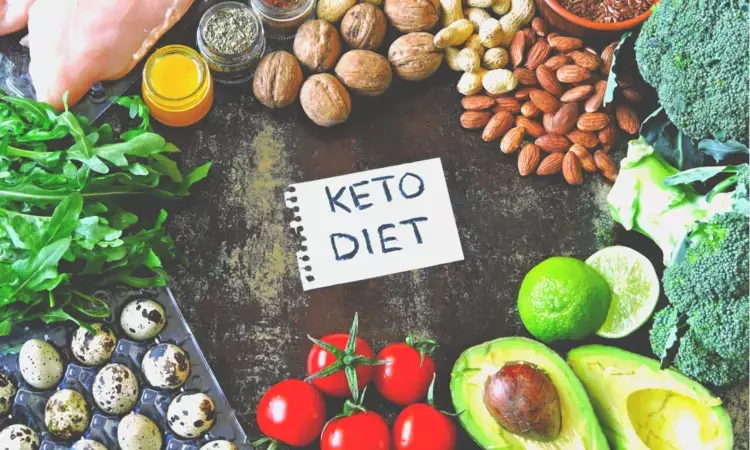- Home
- Medical news & Guidelines
- Anesthesiology
- Cardiology and CTVS
- Critical Care
- Dentistry
- Dermatology
- Diabetes and Endocrinology
- ENT
- Gastroenterology
- Medicine
- Nephrology
- Neurology
- Obstretics-Gynaecology
- Oncology
- Ophthalmology
- Orthopaedics
- Pediatrics-Neonatology
- Psychiatry
- Pulmonology
- Radiology
- Surgery
- Urology
- Laboratory Medicine
- Diet
- Nursing
- Paramedical
- Physiotherapy
- Health news
- Fact Check
- Bone Health Fact Check
- Brain Health Fact Check
- Cancer Related Fact Check
- Child Care Fact Check
- Dental and oral health fact check
- Diabetes and metabolic health fact check
- Diet and Nutrition Fact Check
- Eye and ENT Care Fact Check
- Fitness fact check
- Gut health fact check
- Heart health fact check
- Kidney health fact check
- Medical education fact check
- Men's health fact check
- Respiratory fact check
- Skin and hair care fact check
- Vaccine and Immunization fact check
- Women's health fact check
- AYUSH
- State News
- Andaman and Nicobar Islands
- Andhra Pradesh
- Arunachal Pradesh
- Assam
- Bihar
- Chandigarh
- Chattisgarh
- Dadra and Nagar Haveli
- Daman and Diu
- Delhi
- Goa
- Gujarat
- Haryana
- Himachal Pradesh
- Jammu & Kashmir
- Jharkhand
- Karnataka
- Kerala
- Ladakh
- Lakshadweep
- Madhya Pradesh
- Maharashtra
- Manipur
- Meghalaya
- Mizoram
- Nagaland
- Odisha
- Puducherry
- Punjab
- Rajasthan
- Sikkim
- Tamil Nadu
- Telangana
- Tripura
- Uttar Pradesh
- Uttrakhand
- West Bengal
- Medical Education
- Industry
Very low-calorie ketogenic diet safe and beneficial for obese patients with NAFLD

Italy: Treating non-alcoholic fatty liver disease (NAFLD) with very low-calorie ketogenic diets (VLCKD) is safe and beneficial, a recent study published in the journal Nutrients has found.
The beneficial effect could be due to the simultaneous effects of different factors (commonly associated with NAFLD), such as the reduction of insulin resistance (IR), insulin levels, fat mass and body weight, and induction of ketosis.
This study, conducted on thirty-three subjects who were either obese or overweight and were not taking any kind of drug, revealed that an 8-week VLCKD (<800 kcal/day) might notably decrease liver fat accumulation.
"These results clearly show that carbohydrates restriction to less than 50 g/day usually leads to ketosis, produces a NAFLD improvement in line with the concept that the hepatoprotective role of carbohydrate restriction appears to be boosted when ketogenesis is induced and when there is a marked reduction in total calorie intake," the researchers wrote.
Lifestyle changes, more physical activity and a healthy diet are the cornerstones of NAFLD prevention. These adjustments lower systemic inflammation, enhance IR, reduce fat build-up, encourage weight loss and raise skeletal muscle mass.
Concerning the diet as therapy for body weight reduction, the ketogenic diet is now a popular weight loss intervention with its drastic carbohydrate reduction; in particular, a very-low-calorie ketogenic diet is considered an efficient and secure therapeutic intervention for people with obesity. In obese people, VLCKD is shown to induce several health effects, but more information is needed on the possible beneficial effects of VLCKD on NAFLD in these people.
Considering the lack of information on this topic, Roberta Rinaldi and colleagues from Italy evaluated the safety and efficacy of a VLCKD on NAFLD and parameters associated commonly with this condition in obese/overweight subjects who did not take any drugs in a prospective, real-life study.
The study included thirty-three participants who followed a very-low-calorie ketogenic diet for eight weeks. Data was gathered on bioimpedance analysis, anthropometric measurements, and biochemical assays before and after the dietary intervention. NAFLD diagnosis was made using transient elastography (FibroScan).
The study led to the following findings:
- After VLCKD, there was a significant reduction in BMI (kg/m2) (from 33.84 ± 6.55 to 30.89 ± 6.38), waist circumference (cm) (from 106.67 ± 15.51 to 98.64 ± 16.21), and fat mass (Kg) (from 38.47 ± 12.59 to 30.98 ± 12.39).
- CAP (controlled attenuation parameter; db/m), the FibroScan parameter quantifying fatty liver accumulation, significantly reduced after VLCKD (from 266.61 ± 67.96 to 223 ± 64.19).
- After VLCKD, the FLI (fatty liver index), a benchmark of steatosis, also showed a significant decline (from 62.82 ± 27.46 to 44.09 ± 31.24).
- Fasting blood glucose, triglycerides, insulin, total cholesterol, LDL-cholesterol, ALT, γGT, and FT3 blood concentrations, and insulin resistance (quantified by HOMA-IR) and diastolic and systolic blood pressure levels were significantly lower after VLCKD.
- By contrast, 25 (OH) vitamin D, HDL-cholesterol, and FT4 blood concentrations were higher after VLCKD.
- The variation (δ) of CAP after VLCKD did not correlate with the δ of any other parameter investigated in the study.
To conclude, VLCKD is a helpful approach for NAFLD independence of changes in factors associated commonly with NAFLD (fat mass, obesity, blood pressure, lipids, and insulin resistance) as well as thyroid hormone and vitamin D levels.
Reference:
Rinaldi, Roberta, et al. "The Effects of Eight Weeks' Very Low-Calorie Ketogenic Diet (VLCKD) On Liver Health in Subjects Affected By Overweight and Obesity." Nutrients, vol. 15, no. 4, 2023.
Dr Kamal Kant Kohli-MBBS, DTCD- a chest specialist with more than 30 years of practice and a flair for writing clinical articles, Dr Kamal Kant Kohli joined Medical Dialogues as a Chief Editor of Medical News. Besides writing articles, as an editor, he proofreads and verifies all the medical content published on Medical Dialogues including those coming from journals, studies,medical conferences,guidelines etc. Email: drkohli@medicaldialogues.in. Contact no. 011-43720751


